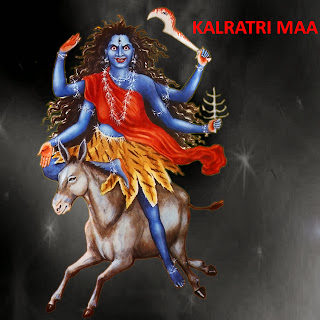Karwa Chauth
Karwa Chauth is an annual ritual celebrated by Hindu married women in North India to seek blessings for welfare, prosperity, safety and long-life of their husbands. In this ritual, married women observe fast, starting the fast after sunrise and ending it with the appearance of moon at night. Karwa means a small earthen pot of water (a symbol of peace and prosperity) and chauth means 'fourth day' a reference to the fact that the festival falls on the fourth day of the dark-fortnight, or Krishna Paksh of the month of Kartik. Sometimes, unmarried women observe the fast for their desired husbands.
As is the tradition following a bath early in the morning, well before dawn, the woman adorns new clothes and partakes of a meal called Sargi which includes pheni (a sweet made by using milk and semolina), parantha, and various types of fruits and sweets. It is traditional for the sargi to be sent or given to the woman by her mother-in-law. For the remainder of the day, the woman is bound to abstain from food and even water, though the more strict rules of observance are not always kept.
Women begin preparing for Karwa Chauth, by buying cosmetics (shringar), traditional adornments or jewelry, and puja items, such as the karwa lamps, matthi, henna and the decorated puja thali (plate). The fast begins with dawn. Fasting women do not eat during the day, and some do not drink any water either. In traditional observances of the fast, the fasting woman does no housework. Women apply henna and other cosmetics to themselves and each other. In the evening, women dress up in special clothes, usually a red or pink sari or 'lehenga-choli' with gold woven 'zari' patterns. All deck up in jewelry and wear mehendi or henna patterns especially on the hands. Fasting women from all over the neighborhood gather in a group and narrate mythological stories that underscore the significance of Karwa Chauth. The Fasting women from all over the neighborhood gather in a group, sit in a circle with their puja thalis, a version of the story of Karwa Chauth is narrated, with regular pauses. The storyteller is usually an older woman. In the pauses, the Karwa Chauth puja song is sung collectively the singers perform the feris (passing their thalis around in the circle).
The first six describe some of the activities that are taboo during the fast and the seventh describes the lifting of those restrictions with the conclusion of the fast. The forbidden activities include weaving cloth (kumbh chrakhra feri naa), pleading with or attempting to please anyone (ruthda maniyen naa), and awakening anyone who is asleep (suthra jagayeen naa).
For The First Six ‘Feris’ They Sing
Veero kudiye karwara, Sarv suhagan
karwara, Aye katti naya teri naa,
Kumbh chrakhra feri naa, Aar pair payeen
naa, Ruthda maniyen naa,
Suthra jagayeen naa, Ve veero kuriye
karwara, Ve sarv suhagan karwara...
For The Seventh ‘Feri’ They Sing
Veero kudiye karwara,
Sarv suhagan karwara, Aye katti naya teri nee,
Kumbh chrakhra feri
bhee, Aar pair payeen bhee, Ruthda maniyen bhee,
Suthra jagayeen bhee, Ve
veero kuriye karwara, Ve sarv suhagan karwara...
In principle, the fast is not to be broken until the moon is sighted at night, and an elderly woman in the house is supposed to narrate the story of Karwa Chauth before the fast is terminated. It In the evening once the moon rises, the women see its reflection in a thali of water, or through a dupatta or a sieve. They offer water to the moon and seek blessings.
" Sir Dhadi,
Paer Kadi, Ark Dendi, Sarv Suhagan, Chaubare Khadi......" This song is sung 5 times while offering water (Ark) to the moon at the night. A parikrama of moon is done each time after offering ark. For parikrama, the lady turns a full circle standing at one place.Traditional tales
The Story of Queen Veervati
Long time ago, there was a beautiful princess name of Veeravati. She was the only sister of her seven brothers. As she grew into young woman, she was married off to a mighty king. As per tradition, Queen Veervati returned to her parent's house to celebrate her first Karwa Chauth after the marriage. She began a strict fast after sunrise but, by evening, was desperately waiting for the moonrise as she suffered severe thirst and hunger. Her seven brothers couldn't bear to see their sister in such distress and build a massive fire behind a mountain instead and trick their sister by convincing her that the glow is the moon. As soon as queen Veervati broke her fast and ate her evening meal, she received a shocking message that her husband died. Inconsolable, the queen rushed back to her husband's house. Along the way, Lord Shiva and his consort Goddess Parvati appeared before her and told her that she had been deceived by her brothers. The glow of light she had seen was not from moon. Queen Veeravati then pleaded for forgiveness. Shiva and Parvati assured queen that her husband would be brought back to life only when she observes strict fast ritual. They further added that her husband would be ill for some time. When queen Veervati arrived at the palace, she saw her husband lying in coma with scores of needles pierced in his body. Queen was able to pull out one piece of needle from king's body daily. In the following year on the day of Karwa Chauth, queen Veervati was full of hope since only one needle is left on her husband's body. Unlike previous year, she was bent on following the rituals strictly and set out to purchase essentials required for Karwa Chauth puja. In this brief intervening period, her maid took off the last needle from king's body and as a result king came out of coma. However, king misjudged the maid as his queen. No need to say that queen Veervati was shocked by this. Despite this, queen remained devoted and observed her fast rigorously. One day when the king was preparing state visit to another kingdom, he asked Veervati what she would want from his state journey. In reply, queen Veervati said she wanted a pair of identical dolls to which the king agreed. Then queen Veervati started humming a song that went as “ Roli ki Goli ho gayi... Goli ki Roli ho gayi”, meaning queen has turned into a maid and the maid has turned into a queen. When the king enquired why she kept repeating the song, Veervati told the whole story. The king felt sorry and re-instated Veervati as his queen.
The Legend of Karwa
|
|



Comments
Post a Comment